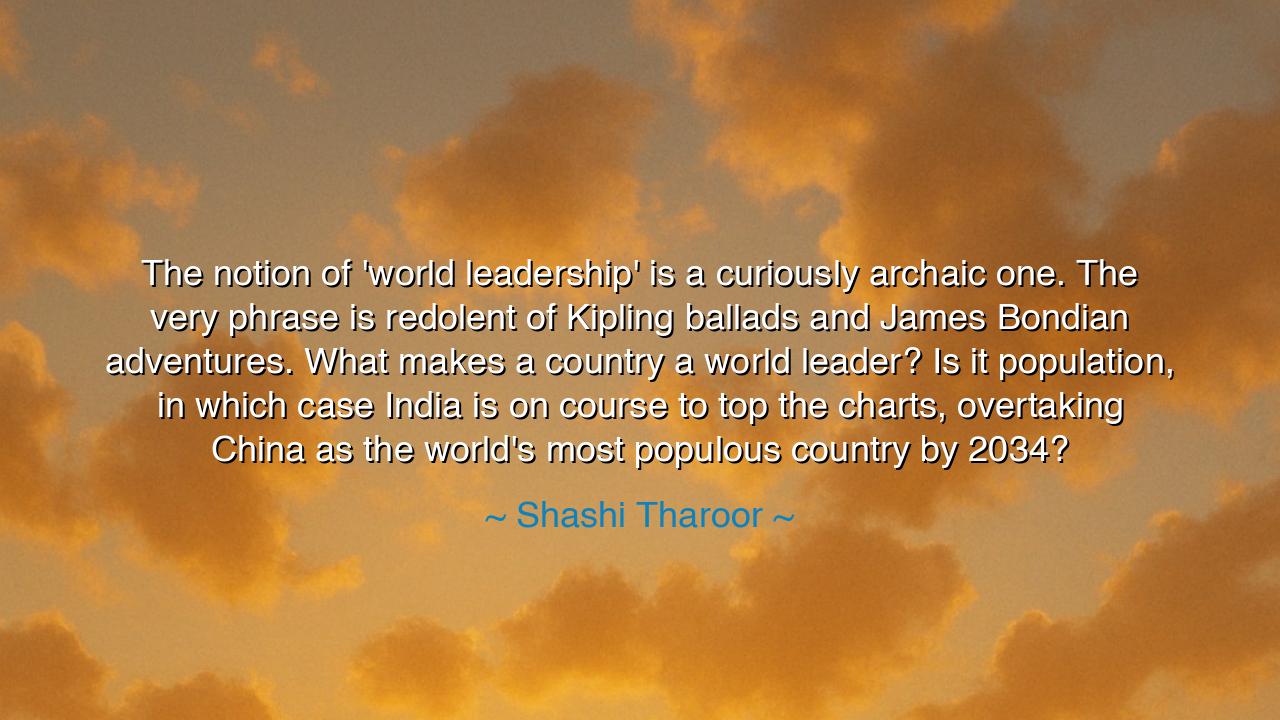
The notion of 'world leadership' is a curiously archaic one. The
The notion of 'world leadership' is a curiously archaic one. The very phrase is redolent of Kipling ballads and James Bondian adventures. What makes a country a world leader? Is it population, in which case India is on course to top the charts, overtaking China as the world's most populous country by 2034?






Hear the words of Shashi Tharoor, thinker, historian, and son of India, who declared: “The notion of ‘world leadership’ is a curiously archaic one. The very phrase is redolent of Kipling ballads and James Bondian adventures. What makes a country a world leader? Is it population, in which case India is on course to top the charts, overtaking China as the world’s most populous country by 2034?” These words are sharp and provocative, for they pierce the illusions of empire and strip bare the hollow pride of nations. They remind us that the old idea of world leadership, forged in conquest and colonial power, no longer serves the realities of the modern age.
Tharoor calls it “archaic,” for indeed the very sound of the phrase evokes visions of British gunboats, imperial parades, and the swagger of Cold War spies. In those eras, world leadership meant dominance—armies marching across continents, empires spanning oceans, secret powers plotting in shadows. It was the age when Rudyard Kipling sang of the “white man’s burden” and when statesmen carved nations like pieces on a chessboard. But today, such imagery belongs more to fiction than to the living heart of humanity. The world is no longer a stage for domination, but for cooperation, complexity, and interdependence.
And yet, Tharoor asks a piercing question: what makes a world leader? Is it mere population, the weight of numbers, the sheer magnitude of bodies that form a nation? If so, then the crown should pass to India, as it overtakes China in the decades to come. But history teaches us that numbers alone do not guarantee greatness. The Mongols once numbered few, yet conquered vast empires; Athens was a single city-state, yet shaped the thought of Western civilization. To equate world leadership with population is to mistake the size of the crowd for the strength of the spirit.
Consider Rome at the height of its power. It was not the largest population on earth, nor even the richest, but its discipline, organization, and vision of law made it the center of the ancient world. Contrast this with China in the same era, vast in population, but more inward-looking, less inclined to project power abroad. This is Tharoor’s challenge: to question whether the old measures of leadership—numbers, armies, territory—have any true meaning in a world where influence is wielded through ideas, technologies, economies, and culture.
The deeper wisdom of his words lies here: world leadership is not a fixed crown to be worn by one nation, but a fluid and evolving concept. It is no longer measured in battles won or colonies ruled, but in the ability to solve global challenges—climate change, poverty, disease, conflict—that no nation can face alone. Leadership now belongs not to the loudest or the largest, but to those who can inspire, unite, and build. The future may belong not to empire-builders, but to coalition-builders, to those who create harmony out of diversity.
The lesson for us is profound: we must unlearn the illusions of old power and embrace the responsibilities of a shared destiny. Do not look to world leadership as a title to be claimed, but as a burden to be shared. Ask not who is the “leader” among nations, but who will step forward in service of the human family. For the crises of our age care nothing for borders, and the true leaders will be those who serve humanity, not those who dominate it.
And what actions must we take? Support policies that value cooperation over conquest, partnership over pride. Recognize that population alone does not guarantee strength; it is the education, creativity, and compassion of a people that matter most. As citizens, we must call our leaders to humility, to service, and to a vision that extends beyond flags and frontiers. For only in such wisdom lies the hope of survival and flourishing.
Thus let Tharoor’s words echo beyond the lecture halls into the conscience of nations: “The notion of ‘world leadership’ is a curiously archaic one.” Let us abandon the dreams of empire and embrace the dream of shared responsibility. For the world no longer needs rulers—it needs stewards, it needs visionaries, it needs builders of peace. And those who rise to this call will be the true leaders of tomorrow.






AAdministratorAdministrator
Welcome, honored guests. Please leave a comment, we will respond soon